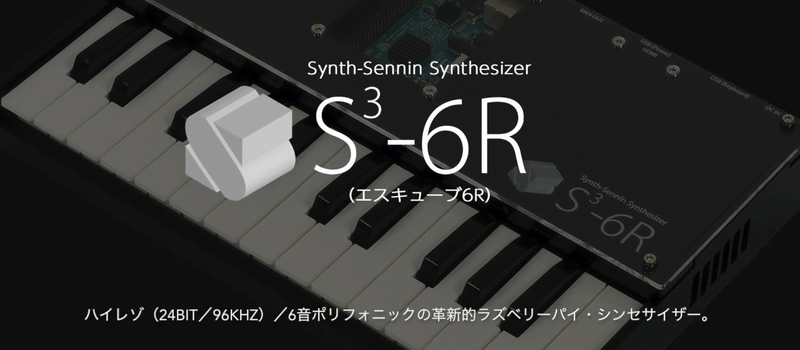Over the last few decades, audio synthesizers have been less and less real hardware and more and more emulations in software. Now that we have tiny powerful computers that merely sip down the watts, what’s the obvious conclusion? A six-voice polyphonic synthesizer built around the Raspberry Pi.
The exquisitely named ‘S³-6R’ synthesizer is a six-voice phase modulation synthesizer that outputs very high resolution (24-bit and 96 kHz) audio. It’s the product of R-MONO Lab, who have displayed interesting musical devices such as a recorder-based pipe organ in the past. This build is a bit more complex, offering up some amazing sounds, all generated on a Raspberry Pi 3.
While talk of oscillators and filters is great, what’s really interesting here is the keyboard itself. The S³-6R is using the Roland K-25m, a tiny MIDI keyboard meant to serve as a ‘dock’ of sorts for Roland’s recent re-releases of the classic Jupiter and Juno synths. Building a MIDI keyboard is not easy by any stretch of the imagination, and using this little keyboard dock is a cheap way to pipe MIDI notes into any project without a lot of fuss.
Below, you can check out the audio demos of the S³-6R. It’s a real synth and sounds great. We can only hope the software will be uploaded somewhere eventually.
















Currently, there are no plans to release as products and to publish the source codes.
:(((
sheesh – that would seem to disqualify it from Hackaday, in my opinion. :-( indeed. Thanks for saving me the time to read more.
I wonder if hackaday is getting paid. I’ve done much more imaginative projects and spent more time than this but I still open source everything. https://github.com/physiii
Their could actually be cool stuff w audio we can do but definitely needs to be a team effort.
As an unofficial hack-or-not-hack judge, I’m going to rule in favor of this thing being a hack. Because (1) they’re using a Roland keyboard dock which wasn’t meant for this purpose. (2) they put a Raspberry Pi into it, instead of some commercial hacker-unfriendly DSP chip. It’s hackable although most of the secret sauce is going to be the C or C++ code that is doing the synthesis. And (3) the laser-cut acrylic top with the cutout window is very hackerriffic.
A not 100% hacker-friendly hack. But a hack.
Don’t worry.
I just bought a K25m for my JP-08.
But my intention is to hack the pinout for the 16-pin ribbon to be able to connect full size keys to the Boutique synths.
So you will at least get that interface out in the open.
This makes me miss the DX7 that I owned about 20 years ago. I never learned to play it properly and sold it. I didn’t realize that I’d need a sequencer for what I wanted to do.
Look at Dexed. There is a port e.g. for Zynthian (http://zynthian.org).
I’m actually working on a similar project involving a RasPi and some 18-bit DACs from Analog Devices. It’s a shame that they’re not publishing build details or source code. I think the Raspberry Pi has some serious promise as an audio hardware MCU given its power, available RAM, and the relative ease with which one can get bare metal C running on it. I’d like to see more projects like this.
I wonder if the software for this project is built on an OS like ChibiOS/RT or if it’s totally OS-free. I’m guessing the former given that it’s limited to six voice polyphony, as phase modulation synthesis is pretty computationally cheap.
ZynAddSubFX is a software freebie that goes far yet has a small footprint. Someone commented that it has been ported to the berry, if so that’s where I want to go.
I want to call it “the berry” from now on. :)
Serouslly. (Why android not know how to spell-check common words…)
The learning curve for setting up a MIDI keyboard or Amp FX pipeline is maybe 1 day with the right cable.
https://qjackctl.sourceforge.io/
http://jack-keyboard.sourceforge.net/
http://jack-rack.sourceforge.net/
http://home.gna.org/jackmixer/
http://guitarix.org/
http://rakarrack.sourceforge.net/
http://zynaddsubfx.sourceforge.net/
http://freecode.com/projects/qsynth
Editors:
https://musescore.org/
https://qtractor.sourceforge.io/qtractor-index.html
http://www.audacityteam.org/
A pi3 will run the several Jack based programs you need to generate audio feeds on HDMI audio .
(You may not find some of these in the repo, and thus may have to compile from source.)
My only complaint about the Jack system was it is still too complicated to set-up initially for kids, but the FOSS community did a great job of connecting the many FX projects using a standard API.
http://www.jackaudio.org/applications/
http://www.rncbc.org/drupal/node/76
https://help.ubuntu.com/community/HowToJACKConfiguration
https://help.ubuntu.com/community/HowToQjackCtlConnections
http://www.jackaudio.org/faq/linux_rt_config.html
The was a program around for schema based auto-configuration of Jack Internal Audio Routing, but I can’t recall the name.
The rabbit hole is deep on this API…
Looks great, sounds great and offers a lot of possibilities to create nice sounds.
Too bad it’s closed off. In the meantime, this looks promising… http://zynthian.org/
There are a whole host of synths – AMS, yoshimi, qsynth etc that all run well on Pi’s and even on the zero if you do a bit of optimisation